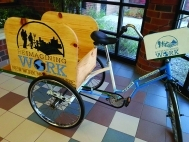REAL COMMUNITIES: New Work, New Culture: What is it?
By Caitlin Childs
 In October 2014, Real Communities Community Builder Teri Schell and I traveled to Detroit, MI, for the New Work, New Culture Conference. This was our second learning journey to Detroit.
In October 2014, Real Communities Community Builder Teri Schell and I traveled to Detroit, MI, for the New Work, New Culture Conference. This was our second learning journey to Detroit.
Because the realities of a rapidly changing economy and impacts of globalization hit Detroit long before the rest of the country, organizers have had many years to envision and put into practice truly sustainable economic development approaches. Instead of waiting for corporations or politicians to solve these problems for them, grassroots organizers and activists dedicate their energies to what is called "Visionary Organizing." Visionary Organizing requires us to imagine the world we want to live in and work to develop the capacity necessary for ordinary people and community organizations to make these visions a reality now, even if it is on a small scale.
In Detroit, viewing the economic crisis as both a danger and an opportunity, folks are reimagining how we think about work and creating the cultural changes necessary to make it reality.
Real Communities is focused on community-based solutions to the social issues that impact people with disabilities. I was curious to learn how reimagining work and economy fits in with our increased efforts around employment for people with disabilities in Georgia through the lens of Real Communities.
What I learned is that new work is about moving away from the idea that "work" and "job" are different words for the same thing. It is about supporting folks to figure out what they are truly passionate about and what gives them energy and power. It is about finding ways to reduce the number of hours people need to participate in the traditional job economy through the use of tools like Community-Based Production (CBP). Then people can dedicate more time to activities they are passionate about and that drive them – or activities that make their neighborhoods and their communities stronger, safer, more connected and self-sustaining for the long haul.
Sounds idealistic, right? But what I observed over and over again is that people in Detroit are putting this into action and developing real strategies to provide for folks' basic needs through CBP models. Creation of products and skills can be exchanged or bartered through Time Banks – a resource that allows people to exchange time for projects and services – and other non-monetary exchange processes. Community-based production in Detroit includes large-scale community agriculture and the development of cooperatives of all kinds – everything from cafes and bakeries to housing co-ops and energy cooperatives.
Teri and I were able to visit Incite Focus, a "fab lab" guided by Visionary Organizing philosophies, which uses new technologies, digital fabrication tools and permaculture to put the tools of production directly in the hands of people in Detroit to create sustainable housing, transportation and other avenues toward economic development.
How can we learn from organizers in Detroit? Can we find opportunities to put some of these philosophies in action here in Georgia? I hope that in the coming years, Real Communities can find partners who want to do just that. We have to acknowledge that in a rapidly changing economy and decreasing services to support non-traditional workers, new approaches are not just a good idea ... they are a necessity.
Caitlin Childs is the GCDD Real Communities organizing director.
Tags: Making a Difference, Real Communities
